Hi there, fellow dog lover! I’m Dr. Candy, your friendly holistic veterinarian. Today, we’re going to talk about Alaskan Malamute Dental Health. As a proud parent of an Alaskan Malamute, you know they’re a breed full of energy and personality. But did you know that, like us humans, your furry friend’s dental health is crucial to their overall health? That’s right, dental issues can lead to other serious health problems if not addressed promptly.
Our focus today is on the common dental problems in Alaskan Malamutes and how to prevent them. We’ll also explore both traditional and holistic treatments, and I’ll share my recommended dental chews and products for this breed. So, whether you’re dealing with Alaskan Malamute teeth care for the first time or you’re a seasoned dog parent looking to improve your pup’s oral hygiene, you’re in the right place. Let’s make sure your Malamute’s smile is as healthy as it is adorable!
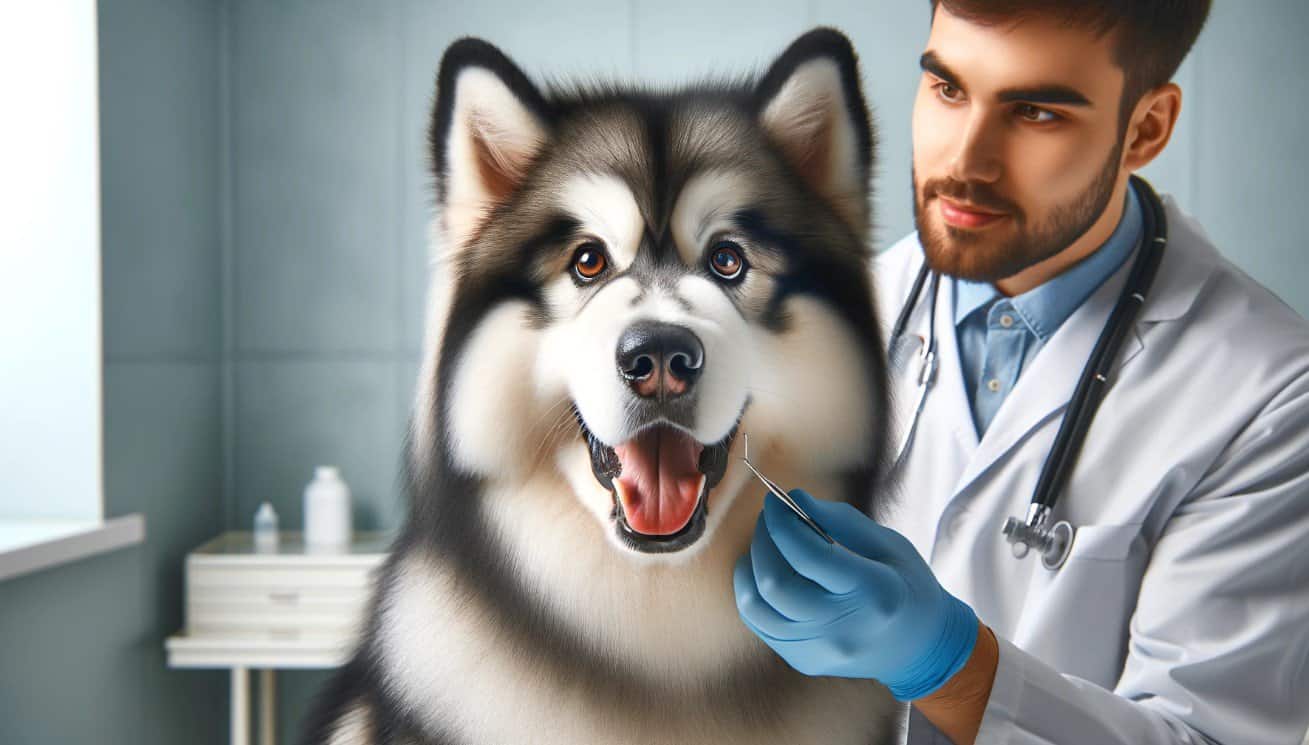
Signs of Dental Disease in Alaskan Malamute
As a holistic veterinarian and a dog parent, I understand how important it is to keep an eye on your Alaskan Malamute’s dental health. Let’s talk about some signs you might notice if your furry friend is dealing with dental disease.
First and foremost, bad breath is a clear sign of potential dental issues. While it’s common for dogs to have a certain level of “doggy breath,” a particularly strong or foul odor could indicate a problem.
Another common sign of dental disease is a change in eating or chewing habits. If your Alaskan Malamute is suddenly reluctant to eat, is eating slower than usual, or is favoring one side of the mouth, it could be due to dental pain.
When you’re brushing your Malamute’s teeth or playing a game of tug, keep an eye out for any signs of discomfort. This could manifest as flinching, crying out, or trying to pull away when you touch the mouth area.
Also, take a peek inside your dog’s mouth every now and then. If you notice that your Malamute’s gums are swollen, red, or bleeding, or if you see any broken or loose teeth, it’s time to consult with a vet.
Finally, excessive drooling or changes in the texture of your dog’s saliva can also be signs of dental disease. If your Malamute is drooling more than usual or if the saliva seems thicker, it could be due to a dental issue.
Remember, these signs are not exclusive to dental disease and could be indicative of other health issues as well. So, it’s always best to consult with a vet if you notice any changes in your dog’s behavior or physical condition.
In maintaining your Alaskan Malamute Dental Health, early detection is crucial. By staying vigilant and knowing the signs, you can ensure that your furry friend gets the care they need right when they need it. Whether it’s a conventional or holistic approach, the aim is to keep those pearly whites clean and healthy, and that wagging tail happy and active.
Common Dental Health Issues In Alaskan Malamute
As a veterinarian, I often see a range of dental health issues in Alaskan Malamutes. These magnificent dogs are prone to certain conditions due to their breed characteristics. Let’s delve into some of the most common ones:
- Periodontal Disease: This is a common issue seen in Alaskan Malamutes. It occurs when plaque and tartar build up on the teeth, leading to inflammation and damage to the gums and supporting structures of the teeth. If left untreated, it can lead to tooth loss and systemic infections.
- Broken Teeth: Alaskan Malamutes are known for their powerful jaws and love for chewing. This can sometimes result in broken or fractured teeth, which can cause pain and infection if not treated promptly.
- Oral Tumors: While not as common, oral tumors can occur in Alaskan Malamutes. These growths can be benign or malignant and should be evaluated by a veterinarian as soon as possible.
Incorporating regular dental check-ups into your Alaskan Malamute’s dental health routine is crucial. This will help catch any potential issues early, before they become major problems. Remember, prevention is always better than cure!
Next, we’ll explore some conventional dental health treatments that can help keep your Alaskan Malamute’s teeth and gums healthy.
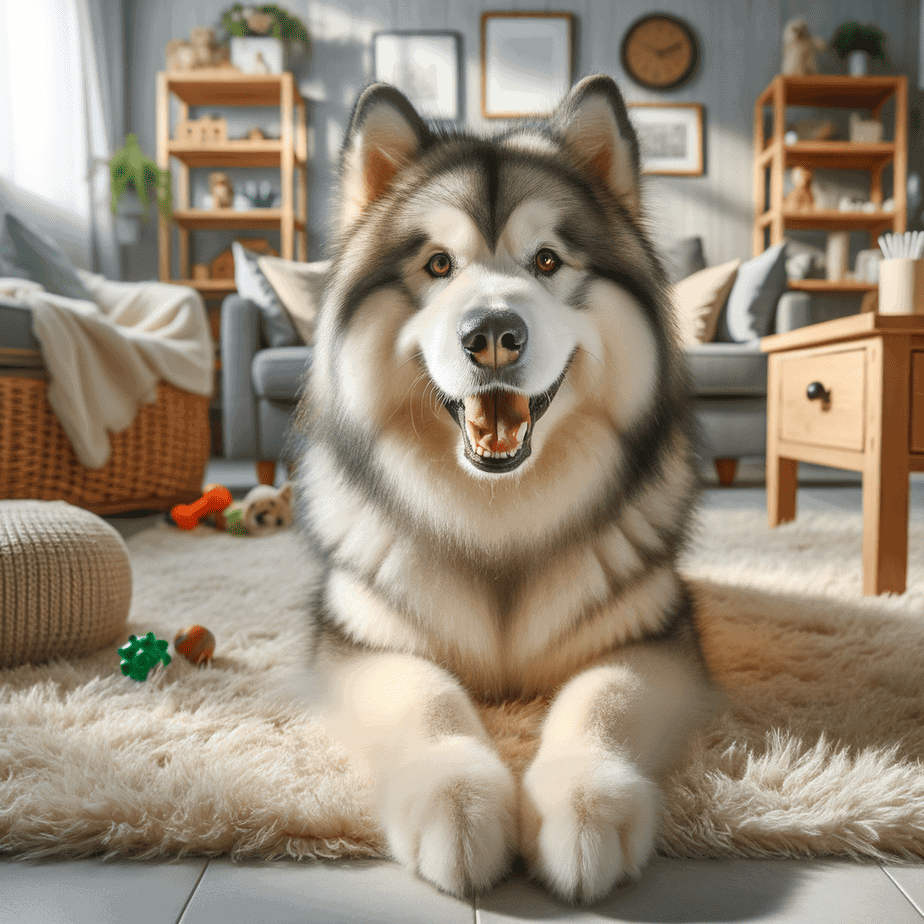
When it comes to Alaskan Malamute Dental Health, conventional treatments play a significant role in maintaining your furry friend’s oral hygiene. These treatments are designed to prevent and manage common dental issues such as tartar buildup, gum disease, and tooth loss.
Anesthetic Dental Cleanings
One of the most common treatments is anesthetic dental cleanings. This procedure is typically performed by a veterinary dentist. Your Malamute will be put under general anesthesia, and the dentist will thoroughly clean their teeth and gums, removing any plaque and tartar buildup. This procedure not only improves your dog’s oral health but also prevents the spread of bacteria from the mouth to other parts of the body.
Potential Individual Health Obstacles
While anesthetic dental cleanings are generally safe, they may pose certain risks for some Malamutes. For instance, dogs with heart problems may have a higher risk of complications from anesthesia. Similarly, certain drug sensitivities could lead to adverse reactions. If your Malamute has a history of seizures, the stress of the procedure and the effects of anesthesia could potentially trigger an episode.
Furthermore, age is a significant factor when considering dental treatments. For extremely old dogs, the risks associated with anesthesia may outweigh the benefits of a dental cleaning. Therefore, it’s crucial to discuss these potential health obstacles with your vet before scheduling an anesthetic dental cleaning.
It’s important to remember that each Alaskan Malamute is unique, and what works for one may not work for another. Regular check-ups with your vet will help identify any potential health issues early and allow for a personalized approach to your dog’s dental health.
Ultimately, maintaining your Alaskan Malamute’s dental health is a crucial aspect of their overall well-being. Through a combination of regular at-home care and professional treatments, you can ensure your furry friend’s smile remains bright and healthy for years to come.
When it comes to Alaskan Malamute Dental Health, it’s important to consider a holistic approach. As a veterinarian, I am a firm believer in the power of diet and probiotics in maintaining oral health. Let’s delve into these two aspects.
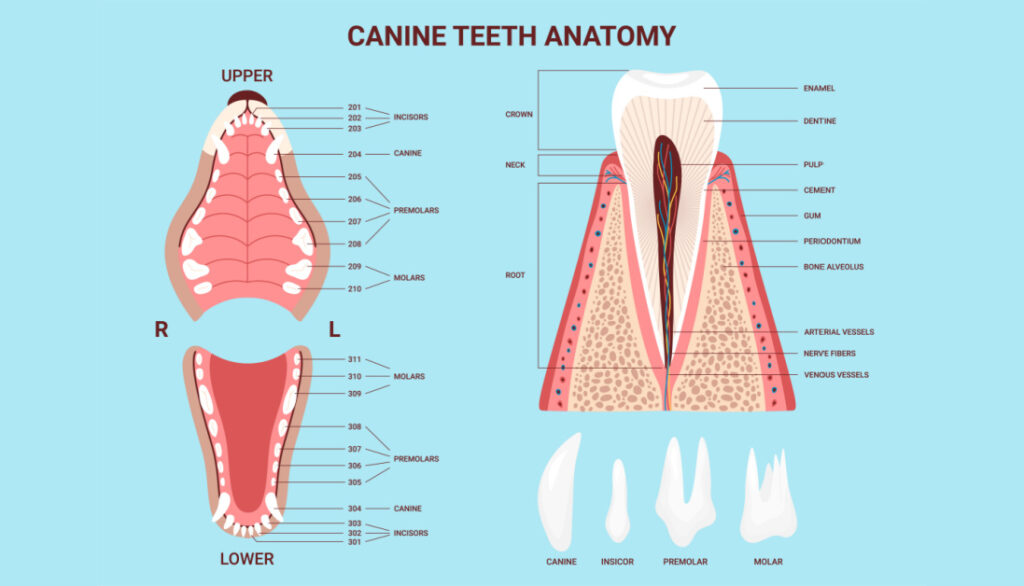
Diet- Low Carbs, Avoid Added Sugars, Enzymes In Fresh Food
Firstly, let’s discuss diet. A diet low in carbohydrates is key to preventing dental disease in Alaskan Malamutes. Carbs break down into sugars, which can lead to plaque buildup and eventually, periodontal disease. Therefore, opt for dog food that is low in carbs and high in proteins.
Avoiding added sugars is also crucial. Always check the label when buying dog food to ensure it doesn’t contain any added sugars. Even some treats can be loaded with sugar, so be mindful of this when rewarding your furry friend.
Lastly, incorporating enzymes found in fresh food can greatly benefit your Alaskan Malamute’s oral health. Raw fruits and vegetables, for instance, can act as natural toothbrushes, scrubbing off plaque as your dog chews. Foods like apples, carrots, and celery are great options.
Oral Health Specific Probiotics
Probiotics are another key component for maintaining your Alaskan Malamute’s dental health. These beneficial bacteria can help balance the oral microbiome, preventing harmful bacteria from causing disease.
One product I highly recommend is Probiora for Dogs. This oral health targeted probiotic is specifically designed to support dental health in dogs. It helps to balance the bacteria in your dog’s mouth, reducing bad breath and supporting overall oral health. Simply sprinkle it on your dog’s food once daily.
Remember, maintaining your Alaskan Malamute’s oral health is a holistic process. It’s not just about brushing their teeth or getting them professional cleanings (though these are important too!). It’s also about feeding them a balanced diet and using products like Probiora to support their oral microbiome.
So, let’s take a stand against bad breath and dental disease in our Alaskan Malamutes by incorporating these holistic strategies into their daily routine. Your furry friend will thank you!

Recommended Dental Chews & Products For Alaskan Malamute
As a loving Alaskan Malamute parent, you may be tempted to reach for commercially promoted dental chews, believing they are a quick, convenient solution for your furry friend’s dental health. However, it’s important to realize that many of these products are not as healthy or effective as they claim to be.
Commercially promoted dental chews often contain a long list of artificial ingredients, preservatives, and even added sugars. These components can lead to obesity, diabetes, and other health issues in your Malamute. Furthermore, they often fail to provide the deep cleaning action necessary to maintain optimal dental health, leading to a false sense of security.
Adding to this, many pet parents resort to water additives, thinking they can help in maintaining their Malamute’s oral health. However, these additives can harm the beneficial bacteria in your dog’s gut, disrupting the balance and potentially leading to digestive issues.
Dr. Candy’s Holistic Approach To Oral & Dental Health
Single source natural proteins like tendons, raw marrow bones, and bully sticks are excellent choices for maintaining your Alaskan Malamute’s dental health.
Tendons
Tendons are a fantastic natural chew for your Alaskan Malamute. They are tough and fibrous, which helps to scrape off plaque and tartar from your dog’s teeth. Plus, they are a good source of protein and collagen, promoting good joint health.
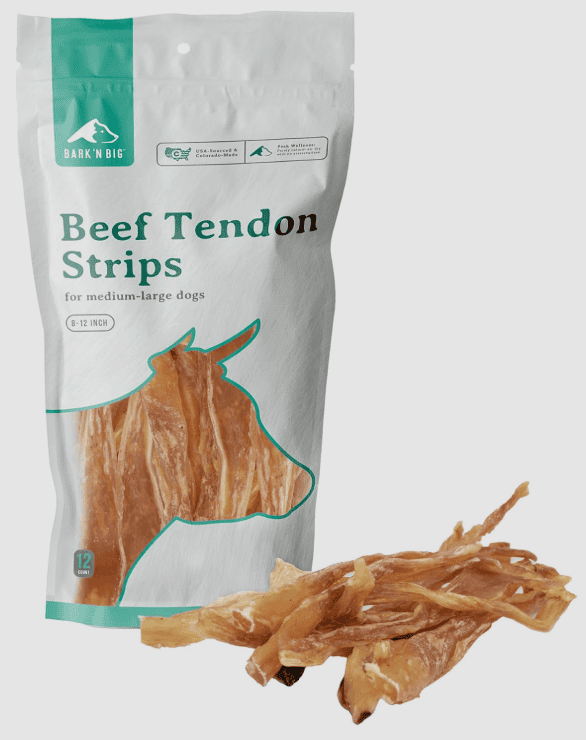
Raw Marrow Bones
Raw marrow bones are another excellent choice for maintaining your Alaskan Malamute’s dental health. They are a natural source of calcium and phosphorus, which are essential for healthy teeth and bones. Furthermore, the act of gnawing on bones can help to clean your dog’s teeth and gums.
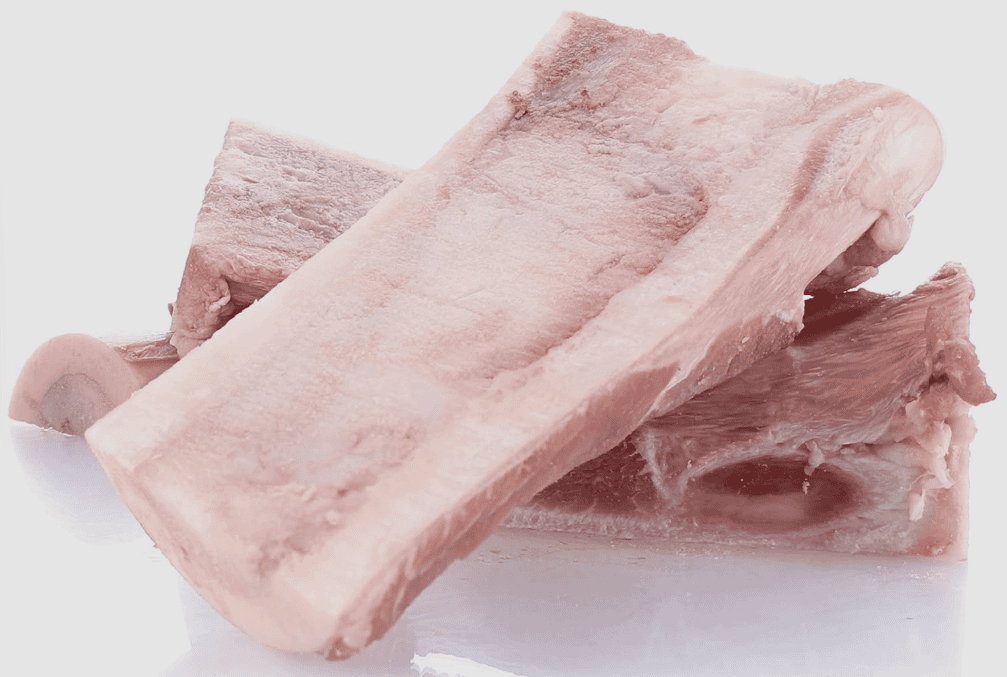
Bully Sticks
Bully sticks are made from 100% beef muscle, providing a natural and digestible chew for your Alaskan Malamute. They can effectively remove plaque and tartar and are a good source of protein. However, always supervise your dog while they’re chewing on a bully stick to prevent any choking hazard.
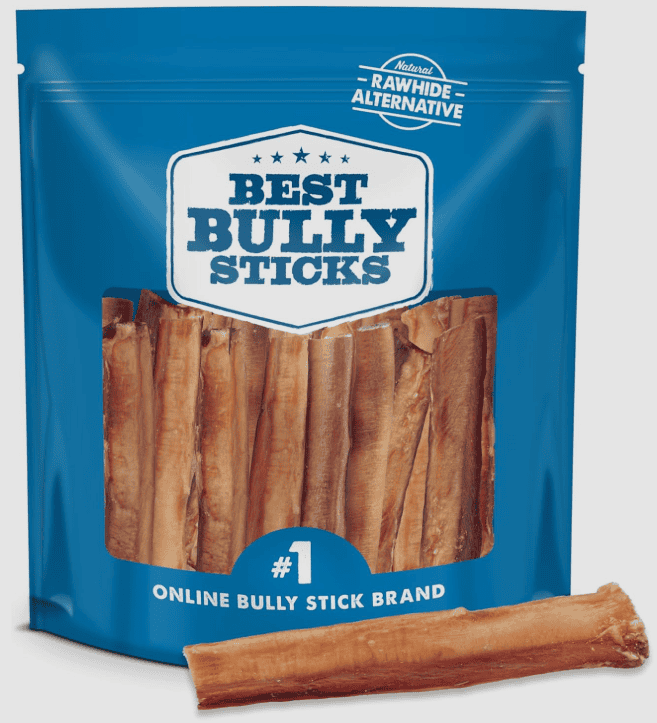
Remember, while these products can significantly improve your Alaskan Malamute’s dental health, they are not a substitute for regular check-ups and cleanings by a professional. Always supervise your pet while they’re enjoying these chews to prevent any choking hazards.
With the right approach, you can ensure that your Alaskan Malamute’s pearly whites remain healthy and strong for years to come. Embrace natural, effective solutions for your pet’s dental care and avoid the pitfalls of commercially promoted products.
Frequently Asked Questions
1. What causes bad breath in Alaskan Malamutes?
Bad breath in Alaskan Malamutes can be caused by various factors such as poor dental hygiene, gum disease, tartar buildup, or underlying health issues.
2. How can I improve my Alaskan Malamute’s dental health?
To improve your Alaskan Malamute’s dental health, you can:
- Brush their teeth regularly using a dog-specific toothbrush and toothpaste.
- Provide dental chews or toys that help reduce plaque and tartar buildup.
- Schedule regular professional dental cleanings with a veterinarian.
- Feed them a balanced diet that promotes good oral health.
3. Are there any home remedies for bad breath in Alaskan Malamutes?
While home remedies may provide temporary relief, it is important to address the underlying cause of bad breath. However, you can try giving your Alaskan Malamute fresh parsley, which may help freshen their breath temporarily.
4. When should I consult a veterinarian about my Alaskan Malamute’s bad breath?
If your Alaskan Malamute’s bad breath persists despite proper dental care, or if you notice other concerning symptoms such as bleeding gums, difficulty eating, or changes in behavior, it is recommended to consult a veterinarian for a thorough examination and appropriate treatment.
